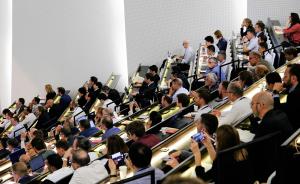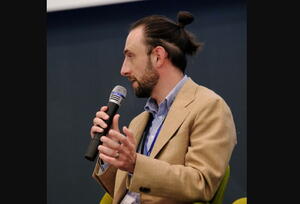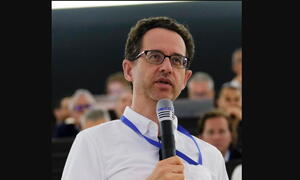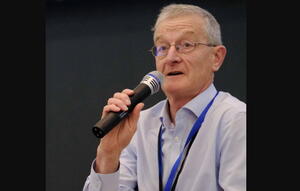ITER enters a shared-information era
Workshop lays groundwork to provide vast amounts of ITER research and expertise to fusion companies.
As ITER embarks on an ambitious initiative to accelerate the global fusion industry by sharing knowledge with private-sector companies, the process faces a commendable challenge: nobody predicted there would be such overwhelming demand.
"This challenge and opportunity is a reflection of ITER's successful contribution to a thriving private fusion industry," says Michael Segal, Head of Open Innovation at Commonwealth Fusion Systems, one of the many private-sector companies seeking easier access to ITER research. "We're at a unique moment in time when many fusion companies are ready to use ITER knowledge. This is a moment for ITER to shine."
To help identify the best process for sharing the mountains of ITER research and data, a veritable who's who of the world fusion community gathered at the Private Sector Fusion Workshop held at ITER Organization Headquarters last week. The goal is to go beyond traditional routes such as publishing results in academic papers and deliver both ITER's "know-how" and its "know-how-not" that has been acquired from years of trial and error.
Pietro Barabaschi, the Director-General of the ITER Organization, is spearheading this knowledge-sharing movement. Noting that ITER was always intended to be a technology transfer project, he addressed the hundreds of fusion experts at the general conference while also holding private side sessions to hear directly from private companies and fusion policymakers.
"We have to provide you the data to take decisions, to move faster, to make fewer mistakes," Barabaschi said. "We need to try and make ITER your home, a place where you can get the information that you need to do your business effectively because it is in our DNA to support the development of fusion."
When the ITER Agreement was signed in 2006, Article 10 emphasized that ITER would support "the widest appropriate dissemination of information and intellectual property." However, when this was written, results were theoretical and there was no private-sector fusion industry to speak of. Over the past decade, there has been what Andrew Holland, the director of the Fusion Industry Association, described as a "Cambrian explosion" in the sector. There are now billions of dollars of private investment in private-sector companies around the world working to bring fusion energy to market via a range of technologies, from tokamaks to stellarators to magnetized target fusion.
More than thirty of these companies were welcomed to the Private Sector Fusion Workshop to discuss the problems they encountered getting information from ITER and how public-private collaboration could boost their development. Several suggestions emerged, such as secondments so company employees could work alongside ITER staff or the opening up of ITER's list of proven suppliers and contractors. But the resounding theme was the hope for a more comprehensive public list of ITER research documents and an efficient official channel for information requests. Without access to ITER research, companies worry that time and money will be spent on tests that have already been conducted.
"It has been challenging to get a hold of information from ITER," said David Kingham, the executive vice chairman of Tokamak Energy, a private fusion company that was spun off from the UK Atomic Energy Authority in 2009. "We have had some success through our one-on-one relationships with ITER scientists, but this doesn't replace transparent, easy-to-use official mechanisms."
One reason the process has been complicated is the complexity of deciding what can be released. As per the ITER Agreement, all generated intellectual property can be shared with ITER Members and Members can then share it with third parties to advance fusion development. However, many documents contain background intellectual property that doesn't belong to ITER, so they must be assessed before release. Another issue is the overwhelming amount of material. It is estimated there are more than one million documents related to the ITER Project that need to be more adequately catalogued in a central database. There is also the question of how to make ITER scientists available to elaborate on the archived documentation.
"ITER can be the knowledge base that will enable tomorrow's fusion industry," said David Weisberg, the lead scientist for Fusion Pilot Plant Integration at General Atomics. "ITER experts would be a valuable resource to help educate the next generation of fusion developers."
In late 2023, the ITER Council requested the ITER Organization and Domestic Agencies to engage with the private sector. So far, last week's workshop is among the most concrete steps taken. In addition, ITER is creating the ITER Design Handbook to compile three decades of technical information and lessons learned. Explorations are also underway of the feasibility of using deep learning and artificial intelligence to corral the vast array of documents and create an easy-to-use database. Another measure to evaluate is whether formalized access could be given for private companies to join the meetings of the International Tokamak Physics Activity (ITPA), which works with ITER to coordinate fusion research.
ITER is also considering other requests, such as opening a secondment program for private-sector employees and creating a dedicated person or office to oversee access to information requests. However, these innovations would require agreement from ITER Members and definable costs to ensure resources are available to maintain the programs in the long term.
While most private-sector companies are seeking support in technical areas such as breeding blanket technology, ITER's Pietro Barabaschi is adamant that the information sharing should include lessons learned during ITER's licensing process.
As the project moves forward, companies are confident that ITER will benefit. "The private companies are in a position to reach certain fusion milestones first, and some of the lessons we learn can help support the global fusion ecosystem, including ITER, in the future," said Michael Segal of Commonwealth Fusion Systems.
In the coming months, ITER will continue working with private companies to understand both thematic priorities and the preferred channels and approaches for sharing information. These priorities will help to lend shape to a more coherent overall program, which is likely to include future private sector fusion workshops.





